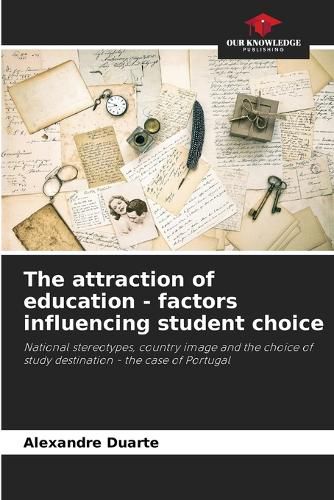Readings Newsletter
Become a Readings Member to make your shopping experience even easier.
Sign in or sign up for free!
You’re not far away from qualifying for FREE standard shipping within Australia
You’ve qualified for FREE standard shipping within Australia
The cart is loading…






This title is printed to order. This book may have been self-published. If so, we cannot guarantee the quality of the content. In the main most books will have gone through the editing process however some may not. We therefore suggest that you be aware of this before ordering this book. If in doubt check either the author or publisher’s details as we are unable to accept any returns unless they are faulty. Please contact us if you have any questions.
This study discusses the relationship between the constructs of image, national stereotypes and attractiveness of higher education (HE) systems, analysing the Portuguese case in the European context. The growing importance of academic mobility (as a consequence of globalisation, policy decisions and the market) together with demographic decline, the increased internationalisation efforts of higher education institutions (HEIs) around the world, and the general increase in global competitiveness has forced HEIs, and their own regions and countries, to increasingly use communication strategies and tools in an attempt to attract investment, resources and students to maintain and improve their position or even survive. The empirical research was based on a sample of European students from various HEIs belonging to the EDCOM network, from which the stereotype of Portugal was measured - based on the Stereotype Content Model (Fiske et al., 2002) and its correlation with the intention to complete all or part of a higher education programme in Portugal. The implications of this study make it possible to understand and thus design strategies to promote the attractiveness of the Portuguese HE system.
$9.00 standard shipping within Australia
FREE standard shipping within Australia for orders over $100.00
Express & International shipping calculated at checkout
This title is printed to order. This book may have been self-published. If so, we cannot guarantee the quality of the content. In the main most books will have gone through the editing process however some may not. We therefore suggest that you be aware of this before ordering this book. If in doubt check either the author or publisher’s details as we are unable to accept any returns unless they are faulty. Please contact us if you have any questions.
This study discusses the relationship between the constructs of image, national stereotypes and attractiveness of higher education (HE) systems, analysing the Portuguese case in the European context. The growing importance of academic mobility (as a consequence of globalisation, policy decisions and the market) together with demographic decline, the increased internationalisation efforts of higher education institutions (HEIs) around the world, and the general increase in global competitiveness has forced HEIs, and their own regions and countries, to increasingly use communication strategies and tools in an attempt to attract investment, resources and students to maintain and improve their position or even survive. The empirical research was based on a sample of European students from various HEIs belonging to the EDCOM network, from which the stereotype of Portugal was measured - based on the Stereotype Content Model (Fiske et al., 2002) and its correlation with the intention to complete all or part of a higher education programme in Portugal. The implications of this study make it possible to understand and thus design strategies to promote the attractiveness of the Portuguese HE system.